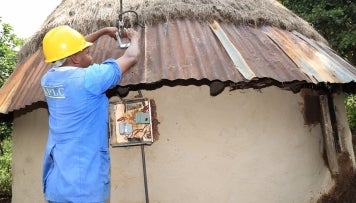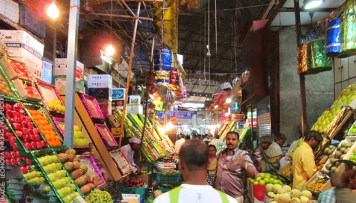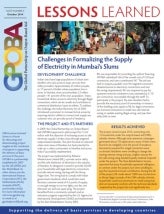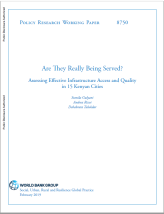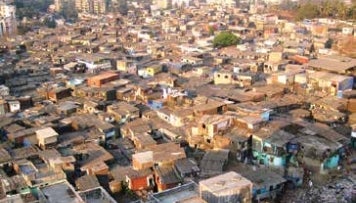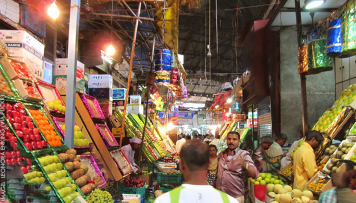
Photo: Leonora Enking via Flickr (CC by SA 2.0)
Reliance Infrastructure, the Global Partnership on Output-Based Aid (GPOBA), and other partners have launched a project to provide improved access to safe electricity supply to around 104,000 Indian slum dwellers.
The GPOBA Improved Electricity Access to Indian Slum Dwellers project aims to provide up to 26,250 new and upgraded electricity connections for residents of the Shivajinagar slum in Mumbai.
About 8,000-12,000 new connections and 5,000 upgraded connections are planned in a first phase expected to be completed by 2011.
Obstacles to electricity access
Currently, many slum households in Mumbai do not have access to safe and reliable electricity. The challenge is that there is no support beyond the regulated point of supply (the metering point). Arrangements are informal and the lack of an institutional framework to support the financing of connections for the poorest leads to bottlenecks in connection investment. The relatively high upfront costs of the connection, which are estimated to be in the region of US$105 per connection, also act as a significant constraint.
Making connections affordable
Under the GPOBA scheme, households will pay less than half the connection cost, with GPOBA providing a one-off subsidy to make up the difference.
Payment of 90 percent of this subsidy will be conditional upon independent verification of working connections and of six months’ supply and billing.
The connection work (wiring from the meter to the house and internal wiring) will be carried out by licensed electricity contractors chosen directly by the customers.
The scheme offers a framework not just for performance-based subsidies, but also for community awareness building, training of electricity contractors, and a check on quality of service to the hutment.
“The Mumbai slum electrification scheme presents an opportunity to understand how output-based aid can be used to supply basic services in areas beyond the regulated utilities’ responsibility,” explains Mustafa Zakir Hussain, GPOBA and World Bank task manager for the project.
“Such techniques could be very applicable as part of a coordinated effort to improve conditions in slums in India and across Asia,” he adds.
Improving access and reducing losses
The GPOBA project, financed through a US$1.65 million grant, forms a financing window in a larger Slum Electrification and Loss Reduction program, led by the US Agency for International Development (USAID) in cooperation with the International Copper Promotion Council (India) or ICPCI.
The program aims to develop, test, evaluate, and scale-up customized approaches for improving electricity access and reducing utility losses in slum areas.
Launch workshop
At a launch workshop for the program hosted by ICPCI, Mr. V.P. Raja, Chairman of the Maharashtra Electricity Regulatory Commission (MERC), outlined the conditions that led to the mass problem of slums in India. He recognized that regulators have not focused on the problems of electricity supply created by slums. He welcomed this project and the opportunity it brings to improve the supply of electricity to this important constituency. Reliance Infrastructure, which is the grant recipient for the GPOBA project, discussed how the scheme fits into their broader program of investment in the electricity network in Mumbai.
Workshop participants also heard about successful slum electrification and loss reduction initiatives in other countries such as Brazil, Indonesia, the Philippines, and Sri Lanka. An example is the Brazilian power distributor Eletropaulo which has implemented several initiatives jointly with USAID and the International Copper Association.
